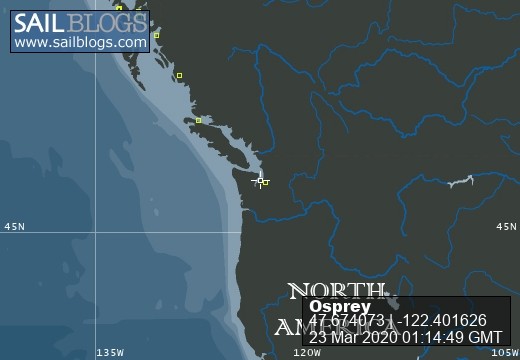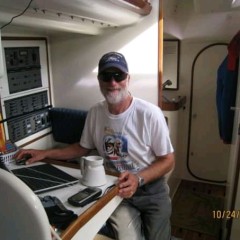Voyages North
23 July 2023
21 August 2021
11 July 2021 | Posted in Seattle
16 May 2021
07 January 2021
10 April 2020 | Posted in Seattle
31 August 2019 | Posted at Port McNeill
31 August 2019
30 August 2019
30 August 2019 | Posted at Port MCNeill
13 August 2019 | Posted at Prince Rupert
13 August 2019 | Posted at Prince Rupert
03 August 2019 | Posted at Ketchikan
02 August 2019 | Posted at Metlakatla
02 August 2019 | posted in Metlakatla AK
22 July 2019 | Posted at Klawock/Craig
22 July 2019 | Posted at Klawock/Craig
09 July 2019 | Posted at Juneau
09 July 2019 | Posted at Juneau
27 June 2019
Two small towns: Zeballos and Walter’s Cove. July 17-July 22, 2016
12 August 2016 | posted at Port McNeill
Elsie Hulsizer
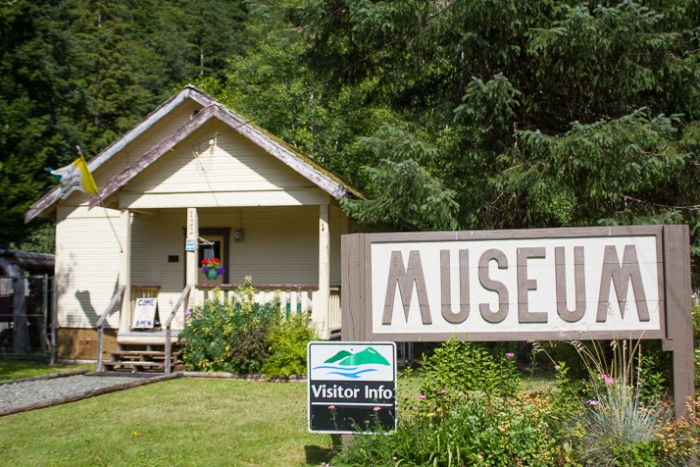
Photo: the Zeballos Museum
We walked down the Zeballos main street, passing several mining-era buildings with their characteristic false fronts. But we were looking for a new building, the Post'n Beam Lodge, the replacement for the Zeballos Hotel that had burned down several years before. We turned a corner and there was the new lodge: natural wood posts, large windows and plastic sheeting on outside walls. Piles of construction debris sat on the ground. A year earlier, when preparing the paperback version of Voyages to Windward, I'd spoken by phone with an owner of the Post'n Beam. He had assured me it would open soon. It was clearly not open now and unlikely to open soon.
When Steve and I visit small towns, we like to eat out at local restaurants. It's an opportunity to meet residents and find out what's going on. But with the Post'n Beam closed, our plans were fast dissolving. We turned and walked along the street, so empty we could have walked down its middle without fear. I pointed to the sign for the Iris Motor Lodge where we had eaten in 2004 among a happy group of sport fishermen. "Maybe they've opened up again." But when we got there a sign in front of the lace-curtained windows said "closed."
Two men were climbing into a large white SUV as we approached the Iris. They must have seen the disappointment in our faces for one of them rolled down a window and said, "This is not a very customer friendly town. A visitor can't even get a bite to eat."
"What happened?" I asked, gesturing toward the Post'n Beam.
"Bankrupt. But they were scumbags. We'll see what the new owners do. They claim they'll open soon. But maybe they'll be scumbags too." He laughed. Taking out a pack of cigarettes, he drew one out and lit it.
I asked him about the Iris Motor Lodge. He laughed again, and said, "It's a lumber camp. That's where we work." Then, with a startling change in subject, he said, "But hey, we could be worse off. We could be a black in America, or a white cop. They just shot three more cops today."
He looked at us and asked, "You're not American, are you?" We had to admit we were.
"Well I tell you, what should really scare you is that fellow Trump. If he gets in, we should all be scared. It's bad. Not that our government is perfect, they should invest more in our people, not just immigrants, but we don't have nobody like Trump."
We assured them we were concerned and did not plan to vote for Trump.
I looked at the two men, red-faced smokers with short hair. They looked like rednecks in America, but their politics didn't sound redneck.
The man at the wheel started up the truck and they drove off, leaving us to walk down the empty street. We passed an attractive little house with a B&B sign in the yard and a For Sale sign on the fence. What was the point of a B&B if there was no place to eat lunch or dinner?
Beyond the B&B was the museum in another small house with a giant rusting pulley in the front yard. On past visits the museum had been closed and we'd had to roust up someone at City Hall to let us in, but to our surprise, the door was open. We walked in and were greeted by a neatly dressed young woman. She was the curator she told us. She'd taken the job for the summer because it would look better on her resume than a job at McDonald's.
The curator showed us around, telling us about the town's history and the several gold mines that once operated here. They'd opened about 1920 and closed at the beginning of WWII, when the workers all went to war. By the time the war was over, there were no workers to come back. She pointed to a photo of a man holding a machine that looked like a big jackhammer. The other reason there were no returning workers was that gold mining was very dangerous and unhealthy and many workers died from injuries and illnesses.
We wandered around the museum looking at the old photographs and other memorabilia. Curious if anyone ever came to the museum in this quiet town I asked her how many visitors she got per day. Four or five, she told us, but the other day she had had 20. Historians and students especially like to come there to study the museum's documents.
We talked some more. The local school was excellent she said. Her boyfriend had attended it but no one from his family would be staying in Zeballos; there was nothing for them to do here.
We'd been looking for a restaurant so we could talk to locals to find out what was happening in town. But we hadn't needed a restaurant to find out what was happening.
Zeballos is an attractive town with quaint stores and houses, attractive mini-parks sprinkled around the town and hiking trails that cross the river delta and lead through the nearby mountains. In 2004 when we came here, I wrote an optimistic story about the town, the way its people worked together and the hope everyone seemed to have for the future. I quoted the owner of the store who told us, "The town is at a crossroads."
Maybe it's still at a crossroads.
Walter's Cove, Kyuquot Sound. July 21-22, 2016
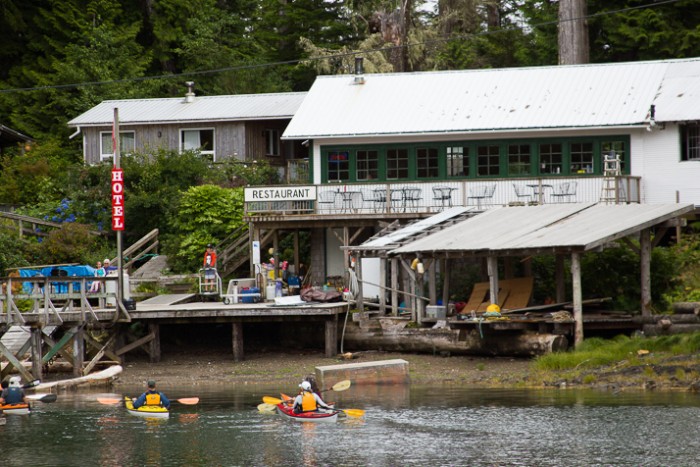
Photo: The Kyuquot Inn seen from the water.
We walked along the dirt trail that led along the waterfront, then turned right and stepped into a forest. Massive spruce trees, straight and tall, towered over us. No matter how many times we visited Walter's Cove the enormity of these trees so close to the little town always astonished me.
We continued our walk, stopping to snack on bright red thimbleberries before coming out of the forest to the waterfront again. We ducked under the overhang of a sports fishing lodge, walked across the front yard of several small ramshackle houses, then turned the corner onto the grounds of the Kyuquot inn. Java the Hutt coffee shop, our destination was on our left, facing the water.
Inside the coffee shop heavy wooden tables and old-fashioned knobbed chairs occupied the floor. We found an empty table and sat down. Notes on a blackboard listed menu items: burgers of various types, pastries and a salad. A young woman came out from behind a counter and took our order: two chicken burgers and coffee.
I had just stood up to look through the shelf of used books for trading when I noticed a middle-aged woman with a pleasant face. She looked familiar. I saw she was looking at me and having the same reaction.
"Haven't I met you before?" she asked.
"Aren't you the daughter of the former lighthouse keepers at Friendly Cove?" I asked her.
We quickly established that she was the lighthouse keepers' daughter and that I had sold her a book here four years ago. We had run into her a number of times in the thirty five years we'd been sailing this coast.
"Sit down and join us," suggested Steve.
We were soon catching up on the news of Walters Cove. The town was doing well, Nicolena told us. She was busy. In fact, she had to leave soon to help at one of the sports fishing lodges that had an overload of guests. That gave us an opportunity to ask about something we'd been wondering about. In Alaska some of the towns resent the sports fishing lodges, believing they don't support the town. In some cases the lodges even bring in hired help from the lower 48.
"Do the lodges support the town?" asked Steve.
"Oh yes, they hire a lot of local workers," Nicolena replied.
Our lunches came and Nicolena left for her job. As I ate, I looked around at the other diners. Many of them were residents of the Native village across the cove. They sat together in groups, talking and texting on their phones (the Kyuquot Inn offers free wifi; there is no cell service.) That was the answer, I thought, thinking of the empty Post'n Beam in Zeballos: the Inn was serving the locals, not just the tourists. Another difference was the low budget operation. Java the Hutt occupied an old school house. The windows were still the classic multi-paned windows of old school houses everywhere. The Post'n Beam represented expensive new construction.
I was thinking about this when I overheard a woman at the table next to us. She was talking about "my store." We had been dismayed to read the sign on the Kyuquot General Store, "MWF 1-5," a significant cut in hours. I wondered if the General Store had competition in the Native village.
I leaned over to ask her. "Excuse me, did I hear you say you owned a store? Is it in the Native village?"
"Oh yes, you can see it from the windows," she gestured across the room. "It's the dark green building just up from the dock."
"What do you sell?"
"Oh, ice cream, snacks, frozen meats, some produce, eggs and things. And some carvings and baskets."
"What are your hours?
She told me some hours that sounded like all day, every day.
"You must have staff to help," I commented.
"Staff? Oh no. I do it all myself."
I tried to reconcile the fact that her store was open all day with the fact that she was sitting here in the restaurant and her store was obviously not open.
"So who's there when you're not?" I asked her.
"Well of course, if I'm not there, it's not open." She shrugged.
That's when I remembered Island Time. The "time zone" Vancouver Islanders lived in that meant they were never in a rush. It didn't matter if she wasn't at her store during working hours. Anyone who lived in the village could just come back later.
I left the restaurant planning to visit her store. But we spent the afternoon and evening watching the Uchuck III unload and the next day working on the boat, shopping at the general store and filling our water tanks. Then we listened to the weather report: a weather window was closing in two more days. If we wanted to make it north around the Brooks Peninsula before the wind turned strong from the north, we needed to leave that afternoon for the Bunsby Islands.
We weren't on Island Time; we were on cruising time.
We walked down the Zeballos main street, passing several mining-era buildings with their characteristic false fronts. But we were looking for a new building, the Post'n Beam Lodge, the replacement for the Zeballos Hotel that had burned down several years before. We turned a corner and there was the new lodge: natural wood posts, large windows and plastic sheeting on outside walls. Piles of construction debris sat on the ground. A year earlier, when preparing the paperback version of Voyages to Windward, I'd spoken by phone with an owner of the Post'n Beam. He had assured me it would open soon. It was clearly not open now and unlikely to open soon.
When Steve and I visit small towns, we like to eat out at local restaurants. It's an opportunity to meet residents and find out what's going on. But with the Post'n Beam closed, our plans were fast dissolving. We turned and walked along the street, so empty we could have walked down its middle without fear. I pointed to the sign for the Iris Motor Lodge where we had eaten in 2004 among a happy group of sport fishermen. "Maybe they've opened up again." But when we got there a sign in front of the lace-curtained windows said "closed."
Two men were climbing into a large white SUV as we approached the Iris. They must have seen the disappointment in our faces for one of them rolled down a window and said, "This is not a very customer friendly town. A visitor can't even get a bite to eat."
"What happened?" I asked, gesturing toward the Post'n Beam.
"Bankrupt. But they were scumbags. We'll see what the new owners do. They claim they'll open soon. But maybe they'll be scumbags too." He laughed. Taking out a pack of cigarettes, he drew one out and lit it.
I asked him about the Iris Motor Lodge. He laughed again, and said, "It's a lumber camp. That's where we work." Then, with a startling change in subject, he said, "But hey, we could be worse off. We could be a black in America, or a white cop. They just shot three more cops today."
He looked at us and asked, "You're not American, are you?" We had to admit we were.
"Well I tell you, what should really scare you is that fellow Trump. If he gets in, we should all be scared. It's bad. Not that our government is perfect, they should invest more in our people, not just immigrants, but we don't have nobody like Trump."
We assured them we were concerned and did not plan to vote for Trump.
I looked at the two men, red-faced smokers with short hair. They looked like rednecks in America, but their politics didn't sound redneck.
The man at the wheel started up the truck and they drove off, leaving us to walk down the empty street. We passed an attractive little house with a B&B sign in the yard and a For Sale sign on the fence. What was the point of a B&B if there was no place to eat lunch or dinner?
Beyond the B&B was the museum in another small house with a giant rusting pulley in the front yard. On past visits the museum had been closed and we'd had to roust up someone at City Hall to let us in, but to our surprise, the door was open. We walked in and were greeted by a neatly dressed young woman. She was the curator she told us. She'd taken the job for the summer because it would look better on her resume than a job at McDonald's.
The curator showed us around, telling us about the town's history and the several gold mines that once operated here. They'd opened about 1920 and closed at the beginning of WWII, when the workers all went to war. By the time the war was over, there were no workers to come back. She pointed to a photo of a man holding a machine that looked like a big jackhammer. The other reason there were no returning workers was that gold mining was very dangerous and unhealthy and many workers died from injuries and illnesses.
We wandered around the museum looking at the old photographs and other memorabilia. Curious if anyone ever came to the museum in this quiet town I asked her how many visitors she got per day. Four or five, she told us, but the other day she had had 20. Historians and students especially like to come there to study the museum's documents.
We talked some more. The local school was excellent she said. Her boyfriend had attended it but no one from his family would be staying in Zeballos; there was nothing for them to do here.
We'd been looking for a restaurant so we could talk to locals to find out what was happening in town. But we hadn't needed a restaurant to find out what was happening.
Zeballos is an attractive town with quaint stores and houses, attractive mini-parks sprinkled around the town and hiking trails that cross the river delta and lead through the nearby mountains. In 2004 when we came here, I wrote an optimistic story about the town, the way its people worked together and the hope everyone seemed to have for the future. I quoted the owner of the store who told us, "The town is at a crossroads."
Maybe it's still at a crossroads.
Walter's Cove, Kyuquot Sound. July 21-22, 2016

Photo: The Kyuquot Inn seen from the water.
We walked along the dirt trail that led along the waterfront, then turned right and stepped into a forest. Massive spruce trees, straight and tall, towered over us. No matter how many times we visited Walter's Cove the enormity of these trees so close to the little town always astonished me.
We continued our walk, stopping to snack on bright red thimbleberries before coming out of the forest to the waterfront again. We ducked under the overhang of a sports fishing lodge, walked across the front yard of several small ramshackle houses, then turned the corner onto the grounds of the Kyuquot inn. Java the Hutt coffee shop, our destination was on our left, facing the water.
Inside the coffee shop heavy wooden tables and old-fashioned knobbed chairs occupied the floor. We found an empty table and sat down. Notes on a blackboard listed menu items: burgers of various types, pastries and a salad. A young woman came out from behind a counter and took our order: two chicken burgers and coffee.
I had just stood up to look through the shelf of used books for trading when I noticed a middle-aged woman with a pleasant face. She looked familiar. I saw she was looking at me and having the same reaction.
"Haven't I met you before?" she asked.
"Aren't you the daughter of the former lighthouse keepers at Friendly Cove?" I asked her.
We quickly established that she was the lighthouse keepers' daughter and that I had sold her a book here four years ago. We had run into her a number of times in the thirty five years we'd been sailing this coast.
"Sit down and join us," suggested Steve.
We were soon catching up on the news of Walters Cove. The town was doing well, Nicolena told us. She was busy. In fact, she had to leave soon to help at one of the sports fishing lodges that had an overload of guests. That gave us an opportunity to ask about something we'd been wondering about. In Alaska some of the towns resent the sports fishing lodges, believing they don't support the town. In some cases the lodges even bring in hired help from the lower 48.
"Do the lodges support the town?" asked Steve.
"Oh yes, they hire a lot of local workers," Nicolena replied.
Our lunches came and Nicolena left for her job. As I ate, I looked around at the other diners. Many of them were residents of the Native village across the cove. They sat together in groups, talking and texting on their phones (the Kyuquot Inn offers free wifi; there is no cell service.) That was the answer, I thought, thinking of the empty Post'n Beam in Zeballos: the Inn was serving the locals, not just the tourists. Another difference was the low budget operation. Java the Hutt occupied an old school house. The windows were still the classic multi-paned windows of old school houses everywhere. The Post'n Beam represented expensive new construction.
I was thinking about this when I overheard a woman at the table next to us. She was talking about "my store." We had been dismayed to read the sign on the Kyuquot General Store, "MWF 1-5," a significant cut in hours. I wondered if the General Store had competition in the Native village.
I leaned over to ask her. "Excuse me, did I hear you say you owned a store? Is it in the Native village?"
"Oh yes, you can see it from the windows," she gestured across the room. "It's the dark green building just up from the dock."
"What do you sell?"
"Oh, ice cream, snacks, frozen meats, some produce, eggs and things. And some carvings and baskets."
"What are your hours?
She told me some hours that sounded like all day, every day.
"You must have staff to help," I commented.
"Staff? Oh no. I do it all myself."
I tried to reconcile the fact that her store was open all day with the fact that she was sitting here in the restaurant and her store was obviously not open.
"So who's there when you're not?" I asked her.
"Well of course, if I'm not there, it's not open." She shrugged.
That's when I remembered Island Time. The "time zone" Vancouver Islanders lived in that meant they were never in a rush. It didn't matter if she wasn't at her store during working hours. Anyone who lived in the village could just come back later.
I left the restaurant planning to visit her store. But we spent the afternoon and evening watching the Uchuck III unload and the next day working on the boat, shopping at the general store and filling our water tanks. Then we listened to the weather report: a weather window was closing in two more days. If we wanted to make it north around the Brooks Peninsula before the wind turned strong from the north, we needed to leave that afternoon for the Bunsby Islands.
We weren't on Island Time; we were on cruising time.
Comments
| Vessel Name: | Osprey |
| Vessel Make/Model: | Annapolis 44 sloop |
| Hailing Port: | Seattle |
| Crew: | Steve and Elsie Hulsizer (author of Glaciers, Bears and Totems and Voyages to Windward) |
| About: | |
| Extra: |
Osprey's Photos - Main
No items in this gallery.
Voyages North on SV Osprey
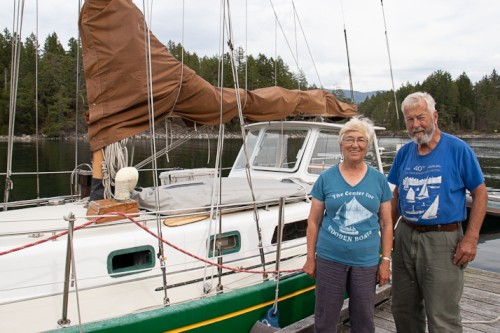
Who: Steve and Elsie Hulsizer (author of Glaciers, Bears and Totems and Voyages to Windward)
Port: Seattle
